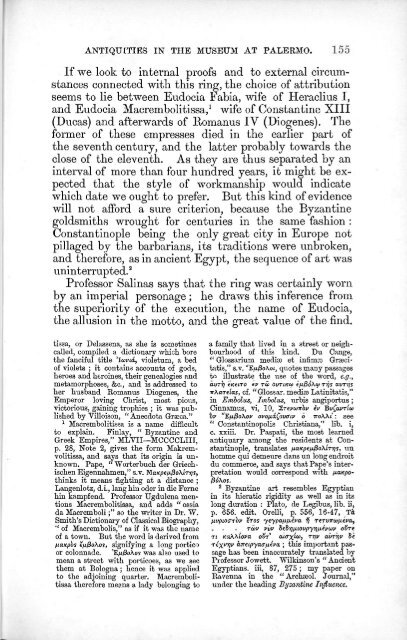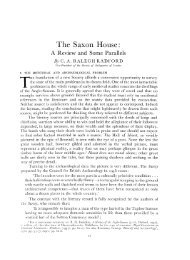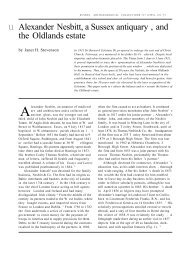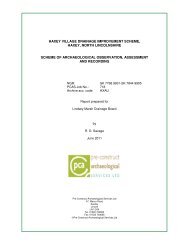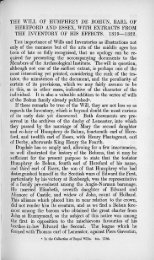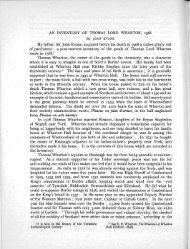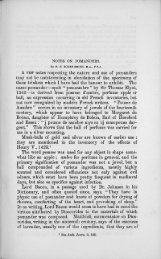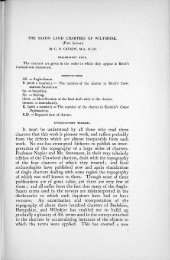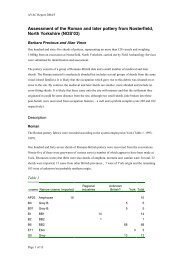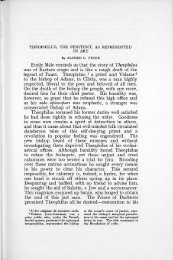Sicily presents to the ordinary tourist attractions which in number ...
Sicily presents to the ordinary tourist attractions which in number ...
Sicily presents to the ordinary tourist attractions which in number ...
Create successful ePaper yourself
Turn your PDF publications into a flip-book with our unique Google optimized e-Paper software.
155 ANTIQUITIES IN THE MUSEUM AT PALERMO.<br />
If we look <strong>to</strong> <strong>in</strong>ternal proofs and <strong>to</strong> external circumstances<br />
connected with this r<strong>in</strong>g, <strong>the</strong> choice of attribution<br />
seems <strong>to</strong> lie between Eudocia Fabia, wife of Heraclius I,<br />
and Eudocia Macrembolitissa, 1 wife of Constant<strong>in</strong>e XIII<br />
(Ducas) and afterwards of Romanus IV (Diogenes). The<br />
former of <strong>the</strong>se empresses died <strong>in</strong> <strong>the</strong> earlier part of<br />
<strong>the</strong> seventh century, and <strong>the</strong> latter probably <strong>to</strong>wards <strong>the</strong><br />
close of <strong>the</strong> eleventh. As <strong>the</strong>y are thus separated by an<br />
<strong>in</strong>terval of more than four hundred years, it might be expected<br />
that <strong>the</strong> style of workmanship would <strong>in</strong>dicate<br />
<strong>which</strong> date we ought <strong>to</strong> prefer. But this k<strong>in</strong>d of evidence<br />
will not afford a sure criterion, because <strong>the</strong> Byzant<strong>in</strong>e<br />
goldsmiths wrought for centuries <strong>in</strong> <strong>the</strong> same fashion :<br />
Constant<strong>in</strong>ople be<strong>in</strong>g <strong>the</strong> only great city <strong>in</strong> Europe not<br />
pillaged by <strong>the</strong> barbarians, its traditions were unbroken,<br />
and <strong>the</strong>refore, as <strong>in</strong> ancient Egypt, <strong>the</strong> sequence of art was<br />
un<strong>in</strong>terrupted. 2<br />
Professor Sal<strong>in</strong>as says that <strong>the</strong> r<strong>in</strong>g was certa<strong>in</strong>ly worn<br />
by an imperial personage; he draws this <strong>in</strong>ference from<br />
<strong>the</strong> superiority of <strong>the</strong> execution, <strong>the</strong> name of Eudocia,<br />
<strong>the</strong> allusion <strong>in</strong> <strong>the</strong> mot<strong>to</strong>, and <strong>the</strong> great value of <strong>the</strong> f<strong>in</strong>d.<br />
tissa, or Delassena, as she is sometimes<br />
called, compiled a dictionary <strong>which</strong> bore<br />
<strong>the</strong> fanciful title 'lami, violetum, a bed<br />
of violets ; it conta<strong>in</strong>s accounts of gods,<br />
heroes and hero<strong>in</strong>es, <strong>the</strong>ir genealogies and<br />
metamorphoses, &c., and is addressed <strong>to</strong><br />
her husband Romanus Diogenes, <strong>the</strong><br />
Emperor lov<strong>in</strong>g Christ, most pious,<br />
vic<strong>to</strong>rious, ga<strong>in</strong><strong>in</strong>g trophies ; it was published<br />
by Villoison, "Anecdota Gra;ca."<br />
1 Macrembolitissa is a name difficult<br />
<strong>to</strong> expla<strong>in</strong>. F<strong>in</strong>lay, " Byzant<strong>in</strong>e and<br />
Greek Empires," MLVII—MCCCCLIII,<br />
p. 28, Note 2, gives <strong>the</strong> form Makremvolitissa,<br />
and says that its orig<strong>in</strong> is unknown.<br />
Pape, " Worterbuch der Griechischen<br />
Eigennahmen," s.v. Μακρεμβολίτης,<br />
th<strong>in</strong>ks it means fight<strong>in</strong>g at a distance ;<br />
Langenlotz, d.i., lang h<strong>in</strong> oder <strong>in</strong> die Feme<br />
h<strong>in</strong> kampfend. Professor Ugdulena mentions<br />
Macrembolitissa, and adds " ossia<br />
da Macremboli;" so <strong>the</strong> writer <strong>in</strong> Dr. W.<br />
Smith's Dictionary of Classical Biography,<br />
" of Macrembolis," as if it was <strong>the</strong> name<br />
of a <strong>to</strong>wn. But <strong>the</strong> word is derived from<br />
μακρύς ΐμβολος, signify<strong>in</strong>g a long portico<br />
or colonnade. 'Εμβολοs was also used <strong>to</strong><br />
mean a street with porticoes, as we see<br />
<strong>the</strong>m at Bologna; hence it was applied<br />
<strong>to</strong> <strong>the</strong> adjo<strong>in</strong><strong>in</strong>g quarter. Macrembolitissa<br />
<strong>the</strong>refore means a lady belong<strong>in</strong>g <strong>to</strong><br />
a family that lived <strong>in</strong> a street or neighbourhood<br />
of this k<strong>in</strong>d. Du Cange,<br />
" Glossarium medi® et <strong>in</strong>fima! Grsecitatis,"<br />
s.v. "ΕμβοΧοί, quotes many passages<br />
<strong>to</strong> illustrate <strong>the</strong> use of <strong>the</strong> word, e.g.,<br />
αυτή e/ceiTO ef τώ ύυτικω εμβόλ,φ τjjs avrrjs<br />
ττλατβίαι, cf. "Glossar. medias Lat<strong>in</strong>itatis,"<br />
<strong>in</strong> Embolus, Lnbolus, urbis angiportus;<br />
C<strong>in</strong>namus, vi, 10, ~2Tevconbv 4ι> Βυζαντίω<br />
bp "Εμβολορ ορομάζουσιρ u πολλι': see<br />
" Constant<strong>in</strong>opolis Christiana," lib. i,<br />
c. xxiii. Dr. Paspati, <strong>the</strong> most learned<br />
antiquary among <strong>the</strong> residents at Constant<strong>in</strong>ople,<br />
translates μακρεμβολίτης, im<br />
homme qui demeure dans un long endroit<br />
du commerce, and says that Pape's <strong>in</strong>terpretation<br />
would correspond with μακροβόλος.<br />
2 Byzant<strong>in</strong>e art resembles Egyptian<br />
<strong>in</strong> its hieratic rigidity as well as <strong>in</strong> its<br />
long duration : Pla<strong>to</strong>, de Legibus, lib. ii,<br />
p. 656. edit. Orelli, ζ. 556, 16-47, Τά<br />
μυριοστύρ iros 'γε'γραμμβρα ή τβτνπωμενα,<br />
των ννν δεδημίουργημίνύορ ούτε<br />
τ ι καλλίονα οϋτ' ακτχίω, την αυτήν δε<br />
τέχνην ίπειρ-γασμένα ; this important passage<br />
has been <strong>in</strong>accurately translated by<br />
Professor Jowett. Wilk<strong>in</strong>son's " Ancient<br />
Egyptians, iii, 87, 275 ; my paper on<br />
Ravenna <strong>in</strong> <strong>the</strong> "Archseol. Journal,"<br />
under <strong>the</strong> head<strong>in</strong>g Byzant<strong>in</strong>e Influence.


